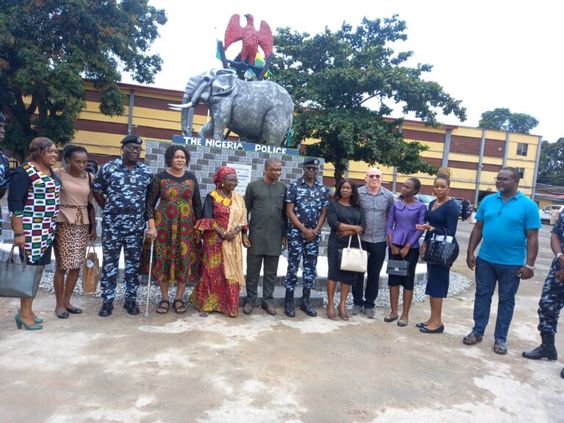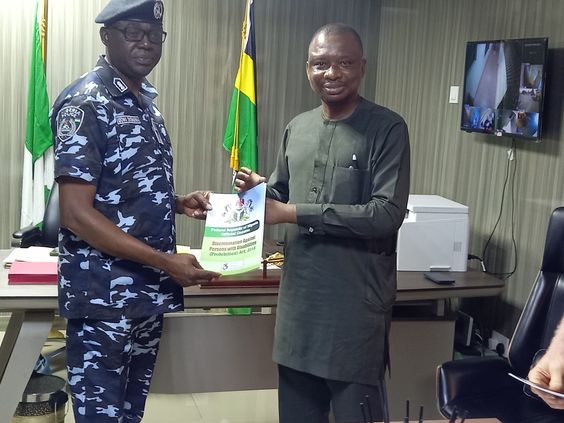Nigeria
Police Lagos Command promises to uphold PWDS’s rights

Idowu Omohunwa, the commissioner of police for Lagos State Command, says the command will take into consideration the rights of Persons Living with Disabilities (PWDs) in the state.
During a Thursday advocacy visit to his office in Lagos by a team from the Centre for Citizens with Disabilities (CCD), Omohunwa offered the guarantee.
Mr. David Anyaele, the executive director of CCD, led a visit to the Nigeria Police Force (NPF), Lagos State Command, with the goal of improving access to justice for people with disabilities.
ACP Mary Ayim, AC Administration, NPF, Lagos State Command, and Ikeja previously welcomed the team.
“ACP Ayim has given me the feedback on the interaction with you as it concerns your wishes,” the police commissioner remarked.
“In regard to the command I am in charge of, I am quite aware of your operations. I contributed to the development of the Desk Office for Persons with Disabilities.
“Some of your demands will necessitate action from the Federal Government, however I am aware that you as a group have been extremely vocal in your presentations on PWD-related matters to the FG.
“For the command, we are considerate of your interests; nevertheless, some of those demands concern structural remodelling, which must first receive FG approval. Despite this, we firmly agree with you.
“However, I tell you that we will take care of the matters within our control, such as sensitising our officers to be attentive to your interests when your rights are violated, protecting you from threats, and paying extra attention when security breaches occur.
You can find partners among us with whom to collaborate,” Omohunwa added.

He stated that ACP Ayim would be in charge of organising PWD affairs and CCD requests.
Anyaele stated in his speech that in order for PWDs to engage and contribute to society to the fullest extent possible, they must have equal access to legal protection, assistance, and remedies.
We are aware of the numerous vows made by security agencies to do everything in their power to completely eradicate all forms of prejudice, harassment, violence, and social vices against people with disabilities and to ensure that justice is done.
However, despite the vital responsibilities that the security agencies have performed, a number of obstacles still prevent PWDs from accessing justice.
He claims that one of the issues is that law enforcement officials receive insufficient training on disability rights, which results in misinterpretations and unjust treatment of PWDs.
The capacity of PWDs to report crimes or request assistance may be hampered by a shortage of sign language interpreters, communication devices for the deaf, and braille instructions for the blind.
PWDs who seek justice frequently experience stigmatisation, discrimination, and verbal and physical abuse at the hands of security personnel, all of which have an impact on how they are viewed, handled, and supported.
It may be difficult for PWDs to physically reach Nigeria Police Force offices and stations, leading in infrastructure discrimination, making it difficult for them to obtain services.
He pointed out that PWDs could be reluctant to report crimes or rights breaches out of fear of retaliation from the police or a lack of faith in the legal system.
He added that PWDs’ ability to engage fully in investigations or judicial proceedings may be hampered if they do not have the required emotional or psychological support.
In order to guarantee that PWDs can reliably seek justice through security services, Anyaele said it was crucial to address these issues and promote a more inclusive approach within the Nigeria Police Force.
In order to advance, improve, and significantly contribute to a more just and equitable society for all individuals, including those with disabilities, he presented certain recommendations.
“That the Nigeria Police Force work with organisations representing people with disabilities (OPDs) to offer officers thorough training on disability rights, proper interactions, and the use of sign language for efficient communication with PWDs who are deaf.
“This will help cops comprehend the difficulties that PWDs confront and guarantee that they are treated with respect. 2. Provide PWDs with convenient options to report crimes and human rights abuses
This entails making certain that reporting and feedback systems are accessible through a variety of communication methods and that officers are properly educated to help PWDs.
He claimed that in order to inform officers and the general public about the needs and rights of PWDs, the Nigeria Police Force must also start awareness initiatives.
“This will support equitable treatment inside the security agencies, lower stigma, and enhance attitudes.
“The NPF should make sure that people with disabilities are safe and protected in risky situations, during natural disasters, and in other emergencies.”
“As required by legislation, people with disabilities should be given priority. Make designated officers (Disability Desk Officers) responsible for handling PWD-related situations your liaisons.
These officers can offer expert assistance, represent PWDs in court, and make sure their rights are upheld.
The Nigeria Police Force will work with disability organisations and other important stakeholders to offer PWDs involved in court proceedings emotional and psychological support services.
“The Nigeria Police should set up systems for keeping track of and reporting incidents of prejudice or mistreatment of PWDs. Make sure that everyone is held accountable and respond appropriately when violations occur.
Anyaele thanked the CP for giving her the chance to discuss some of the difficulties PWDs had in getting justice through security services and expressed her hope that the ideas raised would be taken into consideration.
Additionally, he provided materials outlining state and federal laws and acts pertaining to disabilities.
